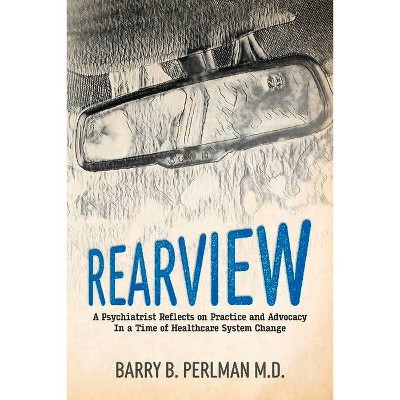Rearview - by Barry B Perlman (Paperback)

Similar Products
Products of same category from the store
AllProduct info
<p/><br></br><p><b> About the Book </b></p></br></br>In Rearview: A Psychiatrist Reflects on Practice and Advocacy in a Time of Healthcare System Change Dr. Barry B. Perlman, a graduate of Yale Medical School, offers an overview of his career in medicine. From his first inklings of interest in mental health tied to his grandmother's bouts of severe depression and his mother's volunteer work with persons discharged from psychiatric hospitals, to his summer jobs in hospitals, through to closing his practice and retirement, Perlman recounts the entire arc of his psychiatric and medical career. <br>Through recalled anecdotes Perlman brings readers along by writing about experiences from medical school and his psychiatric residency. He describes his first professional experiences with dying, his cadaver, and clinical rotations such as neurosurgery and psychiatry. He experienced the English National Health Service when taking his OB/GYN clerkship in London. Readers will be introduced to several of his dedicated professors and their eccentricities.<br>Other chapters introduce topics central to the practice of psychiatry. They include consideration of suicide, violence, poverty, and electroconvulsive therapy. One chapter is revealingly illustrated with art done by patients and ponders the question of what makes art, art. Many of the chapters include interesting case presentations.<br>Dr. Perlman, an activist psychiatrist, served as president of the New York State Psychiatric Association. He was appointed by NYS Governor George Pataki as chair of the NYS Mental Health services Council and to the State Hospital Review and Planning Council. Based in participation, he describes the process and tensions involved in shaping public policy.<br>Readers of Rearview will be taken on a tour of the multidimensional life of an activist psychiatrist whose professional life encompassed provision of direct clinical care, running a psychiatric department under challenging circumstances, and trying to improve the lives of persons serious mental illness.<p/><br></br><p><b> Book Synopsis </b></p></br></br>In Rearview: A Psychiatrist Reflects on Practice and Advocacy in a Time of Healthcare System Change Dr. Barry B. Perlman, a graduate of Yale Medical School, recounts the entire arc of his career in medicine and psychiatry, an epoch which saw dramatic changes in our country's healthcare delivery system. <p/>The book's chapters chronologically trace Perlman's life from his early interest in medicine and psychiatry, through to his retirement more than fifty years later. Each of the book's 41 chapters focuses on a critical point in his medical education, psychiatric training, clinical practice, the challenges of running a psychiatry department at an inner city community hospital, changes to the mental healthcare delivery system and their consequences for patients and doctors, and participation in advocacy efforts on behalf of persons with serious mental illness. With insight and humor he recounts clinical cases and their meaning, persons encountered in the hospital and political life, and topics central to the practice of psychiatry and medicine, including: early exposure to aging bodies and dying, suicide, violence, poverty, confidentiality, and evidence based practice. One chapter is revealingly illustrated with art done by patients and ponders the question of what makes art, art. <p/>Perlman launches each chapter with a recalled Fragment, a pithy introductory statement, which shapes each subject upon which he then elaborates and comments. Each personal commentary places the chapter's theme into a broader context relating it to issues as diverse as personal ethics, societal concerns about psychiatric and medical care, patients' dignity, and how doctors relate to each other and to others including nurses, administrators, social workers, and aides. Readers may find his takes surprising, challenging, and illuminating. His observations are often both unorthodox and thought provoking. He considers the qualities shared between major players in the medical industrial complex and human traffickers. He describes the powerful effects of receiving Firmagon, a testosterone reducing hormone administered during his treatment for prostate cancer, on his efforts to better understand issues related to gender identity. <p/>In another vein, Dr. Perlman provides a look into the professional organizations and New York State agencies with which he interacted. He served as the president of the New York State Psychiatric Association and was appointed by NYS Governor George Pataki as chair of the NYS Mental Health Services Council and as a member of the State Hospital Review and Planning Council. In those roles, he participated in shaping public policy. Over the course of several chapters he affords an insider's view of the countervailing forces which influenced decisions which impacted the health and mental health care of New Yorkers. As he makes clear, few are pure and the system in which we all receive care was not primarily designed for the ease of use and benefit of those served. At a minimum, skepticism is often warranted and, occasionally, cynicism. Nevertheless, he emerges as a strong proponent for the engagement of interested citizen volunteers, such as he was, in the state's regulatory processes. He advocates for their involvement as a way to bring a broader, real world perspectives to bear on state agency employees charged with creating the vital regulatory framework which governs how the state's institutions function. <p/>Readers who delve into Rearview will be taken on a tour of the multidimensional life of an activist psychiatrist whose professional life encompassed provision of direct clinical care, running a psychiatric department under challenging circumstances, and trying to improve the lives of New Yorkers living with serious mental illness. As Dr. Perlman concludes, he feels grateful to those who encouraged and mentored him, the patients who sought his care, and diversity of professional experiences afforded him.<p/><br></br><p><b> About the Author </b></p></br></br>Dr. Perlman returned to NYC after graduating from Yale Medical School. He completed his internship at NYU/ Bellevue Medical Center and his residency at the Mount Sinai Medical Center where he remained as a member of the faculty until becoming the Director, Dept. of Psychiatry at Saint Joseph's Medical Center, Yonkers, NY. He served as president, New York State Psychiatric Association. Governor George Patakin appointed him as chair of the NYS Mental Health Service Council and as a member of the NY State Hospital Review and Planning Council.
Price History
Price Archive shows prices from various stores, lets you see history and find the cheapest. There is no actual sale on the website. For all support, inquiry and suggestion messagescommunication@pricearchive.us




















